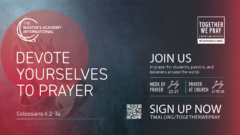Stuff Christians Say obviously struck a nerve; it has racked up tens of thousands of views on YouTube and hundreds of thousands on GodTube. Two guys hop between various locations while offering a long list of “stuff Christians say,” those words and phrases distinct to Christianity. “God thing,” “secular music,” “my testimony,” “traveling mercies”–they are all here. It’s appropriate satire because it rings true. As Christians we can become oblivious to the fact that we have developed a lexicon all our own.
“Stuff Christians Say” got me thinking about not only the little words we use, but the big ones, the theological descriptors. I have often encountered articles telling us that we should avoid using big and unusual words to describe what we believe. The “-ologies” should be avoided–soteriology, eschatology and Christology. So too should the words that are used almost exclusively by Christians–propitiation, sanctification, hermeneutics. After all, what could be more seeker-unfriendly than inviting a person to church and then using words that have no meaning to him? Won’t this make that visitor feel like an outsider?
It seems to me that there are at least two varieties of words in the Christian lexicon, those that are trite and those that are specific. “God thing” is a trite phrase that has no objective meaning and there is not much to lose if we never use it again. “Propitiation” is a very precise term that has a distinct meaning. It is this second category that I believe we need to hold on to and we need to hold on to such words without shame. We impoverish ourselves when we lose these words. We impoverish ourselves if we never learn and teach these words.
I cannot think of any other field or area in which the use of unique and difficult words and phrases is deemed inappropriate or less than ideal. Instead, we educate people to understand what those words mean and then to use them appropriately. Any doctor will testify that a large part of his education was learning the precise terms for the various parts and functions of the body and the very precise ways of referring to conditions and diseases. It would not inspire confidence in your doctor to hear him say, “Well, it looks like you’ve got an owie on that dangly thing in the back of your mouth.” You would not want to turn your fridge over to an appliance repairman who pulled the fridge out, took a look, and said, “I think it’s leaking and you need some more of the cold-making stuff.” Or the radio play-by-play man who had no idea how to describe a play and who had no knowledge of the appropriate statistics. Or the professor of philosophy who had never heard nor used the word “epistemology.” We could dig up examples all day long.
As we grow in our knowledge of any field we necessarily begin to learn the words that are especially important to it. It is assumed that many of these words will be unique and that they will carry precise meanings. This is as true to the Christian faith as it is to any other area. We do not need to run away from these words, but to help people grow into them.
Of course this does not mean that we should use these words all the time and in every circumstance. We don’t all need to run around like young seminarians, thrilled with new words and assuming that everyone else shares that enthusiasm. But neither should we run away from them. Perhaps it is best to agree among ourselves that we will only use those big words if we can prove we understand them by first defining them in simpler terms.
The challenge is to not learn new words abstractly or mindlessly but worshipfully. In the Christian context “propitiation” carries a specific meaning that is absolutely crucial to a right understanding of God’s act of saving his people. There is no other word that carries all the nuance and significance of that word. To learn it and understand it is to grow in our knowledge of God and to grow in our understanding of his grace and glory. To learn the word and all it represents is to have new opportunities to worship God for being who he is. The study of theology, and even the study of a single word, is meant to lead not only to knowledge, but to worship.
There is a direct relationship between our knowledge and our worship. There is a time and a place for simplicity, but there is also a challenge before us to grow in our knowledge, or, to use a biblical metaphor, to grow from milk to meat. We grow in knowledge, at least in part, when we learn those advanced words and the crucial meanings they represent. And as we grow in our knowledge of who God is and what he has done, we grow equally in our ability to worship him on that basis. Those who worship God most fully are those who know God most fully.










